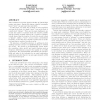Free Online Productivity Tools
i2Speak
i2Symbol
i2OCR
iTex2Img
iWeb2Print
iWeb2Shot
i2Type
iPdf2Split
iPdf2Merge
i2Bopomofo
i2Arabic
i2Style
i2Image
i2PDF
iLatex2Rtf
Sci2ools
181
click to vote
VLDB
2007
ACM
2007
ACM
Effective Phrase Prediction
Autocompletion is a widely deployed facility in systems that require user input. Having the system complete a partially typed "word" can save user time and effort. In this paper, we study the problem of autocompletion not just at the level of a single "word", but at the level of a multi-word "phrase". There are two main challenges: one is that the number of phrases (both the number possible and the number actually observed in a corpus) is combinatorially larger than the number of words; the second is that a "phrase", unlike a "word", does not have a well-defined boundary, so that the autocompletion system has to decide not just what to predict, but also how far. We introduce a FussyTree structure to address the first challenge and the concept of a significant phrase to address the second. We develop a probabilistically driven multiple completion choice model, and exploit features such as frequency distributions to improve the quality o...
Related Content
| Added | 05 Dec 2009 |
| Updated | 05 Dec 2009 |
| Type | Conference |
| Year | 2007 |
| Where | VLDB |
| Authors | Arnab Nandi, H. V. Jagadish |
Comments (0)

